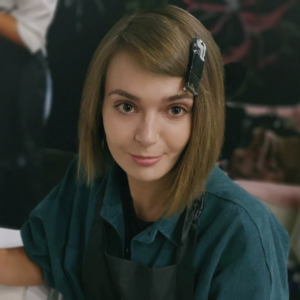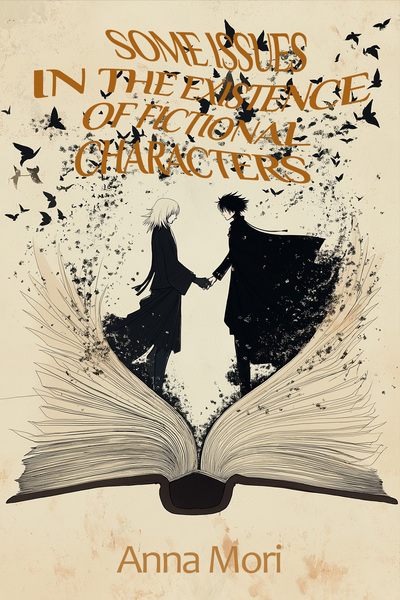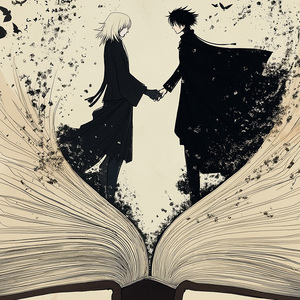Holy wisdom is not clear and thin like water, but thick and dark like blood.
— C.S. Lewis, Till We Have Faces
We are not meant to come together, not any more than sun and moon were meant to come together, or sea and land. We are sun and moon, dear friend; we are sea and land. It is not our purpose to become each other; it is to recognize each other, to learn to see the other and honor him for what he is: each the other's opposite and complement.
— Hermann Hesse, Narcissus and Goldmund
After Tokyo of the 21st century, Makishima found himself thinking more and more about stories — about turning points, about resolutions. He never forgot that their ultimate goal was to find a way out of the library, and it was beginning to feel like salvation was just one step away — one step they simply weren’t taking.
Everything that had happened to them recently — the second-rate books, the sudden, profound, and genuine experiences, the fragments of their strange conversations — was slowly forming a larger picture. And yet, no matter how hard Makishima tried, he couldn’t quite explain to himself what, exactly, he was seeing in it.
"I always thought all that blank space could be put to better use..."
"We are more than the story..."
At last, he came up with something. He went to L and said:
“There’s a genre I’ve always thought was utterly pointless. But maybe it’s exactly what we need.”
“Poetry?” L guessed.
“Close. Magical realism.”
This time, Makishima took his time selecting the right book — pacing along the shelves, picking up books, flipping through them, muttering in dissatisfaction before putting them back. Finally, he found one where the text felt right.
“And what’s going to happen to us in there?” L asked curiously.
“No idea,” Makishima admitted.
Inside the book, it was the same gray, brown, and black autumn. Because, of course, these things had to happen in autumn. Autumn was the season of change, the turning of the wheel, the time when the veils between all possible and existing worlds grew thin, when opposites and contradictions could meet — just as the lines of a railway track merge into a single shining point on the horizon.
The trees were nearly bare; the air was damp with a fine mist of rain, filled with the scent of smoke and forest. It was as if they had never left.
Except that the house-library was gone.
Instead, there was a playground — a small, abandoned one. A warped wooden slide, an old swing set (a few yellow leaves stuck to the boards), a crooked iron rocket. Piles of wet leaves, lazily raked to the edges of the lot. The puddles reflected the low, overcast sky, braced by the black branches of the trees.
In the center of the playground, a boy in black was spinning slowly on a rusted merry-go-round. He was alone, but that didn’t seem to bother him.
A boy in white — who, in another life, had once been called Makishima Shougo—would have liked to climb onto the merry-go-round, too. But someone had tied him to a tree at the edge of the playground — spread out like a crucifix, as if nailed in place. At least, that was what he thought at first.
Then he saw.
His arms, from the wrists to the fingertips, had shriveled, blackened, twisted into knotted branches and grown into the tree. The same had happened to his legs below the knees.
The merry-go-round creaked. The boy in black kept spinning. The boy in white couldn’t move — he could only watch.
He wanted to call out to the other boy, to ask for help, but he was too scared, too much in pain, and instead of a cry, only a broken sob escaped his lips — and a few yellow leaves spilled from his mouth.
His wrists and legs ached terribly. His body was filled with secrets and rotting monsters. The pain was so immense that he could no longer tell how long he had been there — five minutes, an hour, a week, an eternity. He didn’t know what had caused him to grow into the tree or how long he would remain like this. And there was no one to ask.
The merry-go-round gave one last creak and came to a stop. The boy in black stepped off and approached the one hanging from the tree — not too close, moving carefully, like an autumn shadow that might vanish at any moment into the others.
“Does it hurt?” he asked with quiet sympathy.
He was beautiful and terrifying, this boy in black. The boy in white recognized his face — it was the sound of bare branches moaning in the November wind, the beating of a raven’s wings — but he couldn’t remember his name.
“It hurts so much. Can’t you see?” the boy in white tried to say, but more leaves fell from his mouth instead. “Help… me,” he managed, barely.
“How can I help you?”
“Un—ghh—tie… me.”
The boy in black tilted his head to one side — a familiar gesture, the boy in white thought. He knew this person. How had he forgotten?
“But aren’t you where you’re supposed to be?”
“I don’t know. It just hurts… it hurts so much…”
The boy in white tried to cry, but no tears came. His eyes were dry, like tree bark.
"If you can't... free me... then stay... ghh... with me," he pleaded.
"I can stay with you for a while," the second boy said evasively. The one on the tree flinched in fear.
"Don't leave! Please... I don't want to be alone."
The boy in black took a startled step back.
"I can't... Everyone is alone, you understand? In truth, there's no one here with you."
"But I'm talking to you..."
"You're probably just talking to yourself. Just as I am talking to myself — and to no one else."
That couldn't be true. The boy in black looked too real, too sharp and vivid — especially compared to his companion, who seemed pale by contrast, as faint as a breath of starlight, as if he were a ghost of himself... But the boy in white didn’t know how to argue, so instead, he asked, frightened:
"Isn’t there... any way to prove it?"
"No. Maybe you've just been alone too long, so you made yourself a friend."
"Or maybe... you've been alone too long."
The boy in black stared at him for a long time, unblinking. When he finally spoke, his voice was dry, like the whisper of fallen leaves underfoot.
"Maybe. But it doesn’t matter. We have equal claims to existence. Or nonexistence. No one can prove that there's anything or anyone in the universe except you. No one can be relied upon. Nothing can be believed in. You are alone, just as I am alone. Everything could be an illusion. You might be nothing more than a dream of mine, and if I wake up, you’ll vanish like a candle snuffed out. Maybe you and I are even the same person."
"If you... truly believe that... then why did you give me hope?" Leaves scraped against his throat, making it hard to breathe; something inside his chest ached, tearing its way out.
"Because..." The boy in black sighed. "...I do want to help you. But I can't, you see? No one can save you except yourself. We are all alone. There is nothing. No matter what you do, your play has no audience..."
"Stop. Shut up! It hurts..."
That thing inside his chest, that living, writhing pain, finally overflowed and poured out of him in a flood of leaves, dark as blood. Though maybe there was blood mixed in, too — because along with the leaves, he vomited up filth: slime, splinters of bone and sinew, damp, filthy feathers. He coughed, his chin smeared with that sickly sludge, but he couldn’t even wipe his mouth — his hands had become bare, brittle autumn branches.
He saw the worms writhing in the mess that had spilled from his mouth, and another wave of nausea wracked him — a fresh surge of leaves and grime gushing onto the ground.
The worst part was that the boy in black was watching. Now he knew — he had seen the rot inside him...
The boy in black stood motionless, his gaze unreadable. Then he crouched and reached out, touching the scattered debris. He picked something up — it was a thin, jagged fragment of bone.
"Feathers, bones... Do you know what this is? Wings. Did you swallow an angel?"
"Help me," the boy in white repeated. Speaking was easier now; only a single leaf fell from his lips. "I know I'm real. I think. I feel pain. Sadness. Regret. Loneliness."
The boy in black stretched out his hand toward the place where the pale, fragile wrist had fused into the dark bark of the tree — but almost immediately, he withdrew, as if afraid to touch it.
"I know it won't work. But since you're asking, I’ll try..."
After a brief hesitation, he pressed the sharp edge of the bone against the bark, just above the boy's wrist, trying to carve him free. He cut for a long time. The tree was wet with rain; the sharp bone kept slipping, nicking the skin, and the boy in white bit his lip to keep from crying out.
The bone cracked and broke. The scratches it had left on the bark were pathetically thin, barely visible. But the boy in black found another shard of bone on the ground, one with a sharper tip, and stubbornly moved to the other wrist.
It felt like an eternity had passed. At one point, the bone slipped again, this time piercing deep into the wrist, and the boy in white let out a sharp cry of pain.
The boy in black froze, then pulled his hand away. It, too, was now smeared with blood, just like the boy bound to the tree.
"I'm sorry," he said desperately. "I told you — I can't free you. I'm only hurting you, and the tree doesn’t even bear a scratch... I can't help anyone. I’m not a real person, you understand?"
He unbuttoned his shirt as if he wanted to show something. His skin was so pale it was nearly translucent, glowing faintly in the misty air. Beneath it, purple inscriptions shimmered just beneath the surface. Even the dark circles around his eyes, which gave him that enigmatic, somber look, weren’t shadows at all — when one looked closely, they were tightly packed lines of writing, an unbroken script winding around his eyelids like ribbons of ink.
"Look at me. I'm just words. I’m an illusion, a fiction, a lie. We are both nothing but ghosts who decided to pretend to be human and gave each other names. Even if I want to help you, my wants aren't real."











Comments (0)
See all